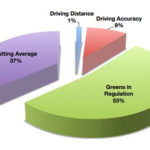Stop feeding the monster
by: B. J. Hathaway
We have all played with THAT guy. He hits some good shots and can be a pleasant fellow to have in your foursome and may even have a few new jokes. And then it happens. It’s a short part four with water guarding the front of the green. After he finds the fairway from the tee he grabs wedge and lines up carefully after pacing the yardage. A few waggles, then “sploosh” into the water and the sound of a whistling golf club flies over your head like an attack helicopter.
Over the next three holes you have to listen to him complain, berate himself and endure the tension he is creating in the group because of one bad shot. He now hates himself, hates the game and makes the rest of the round an endurance contest. What you didn’t know was that he came to the course with his monster and he enjoys feeding it. Every time he feeds that monster it grows stronger and more dominant.
Imagine two kids out riding bicycles and having fun. Suddenly they bump each other and both fall onto the concrete and scrape their knees. The first kid starts whaling and screaming and mommy comes rushing over, picks him up and carries him into the house. She returns with bandages and ointments and encourages the child to cry and tell him how awful it was and how it’s not his fault. The other kids feels the pain and starts to cry also and his mom also comes to see that he is ok, but instead of adding to the excitement she grabs a cold wet cloth, cleans the scrape and assures him that nothing is broken and how a strong boy like him will be just fine.
The problem with the first kid is that now every time he falls he will expect drama and lots of attention. The second child however has learned that sometimes you fall and it hurts but you’re gonna be ok and there’s no reason to react in a way that makes it worse. Now, think about how some people handle bad shots on the golf course. How about your own reactions to a missed putt, a duffed chip or that drive that bounced O.B. How you react creates a future habit of reaction and emotions that can have a calming influence or just feed the drama monster.
The problem with feeding him is that he gets accustomed to being fed during situations that give him the biggest meal. That 15 yard pitch shot that you dumped into the bunker, well he knows you will give him a large bowl of Emo Stew if you don’t succeed. So in your back swing he has a quit chat with your brain and convinces him there’s no way you can get that over the bunker right now. When you look up there goes your ball into the fluffy sand. Every time you feed him he will want to come back again and you are there waiting for your golf mommy to come make it better by allowing that temper tantrum and getting lots of attention.
Or we can try a different tactic called acceptance. Now it’s not that we are resigning ourselves to embrace failure but rather to understand that we will occasionally hit a golf shot or three that is well below standard and that even with preparation and practice for some reason they just show up. Like those thoughts that pop into your head that you don’t want, they just kind of happen sometimes. There’s no reason to give it lots of attention and neither is there to attach lots of negative emotions to a golf shot that was obviously not what you intended. You don’t have to accept the bad shot or even like it, but you also don’t have to feed the monster.










